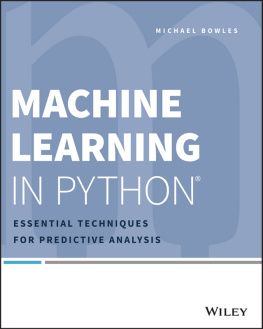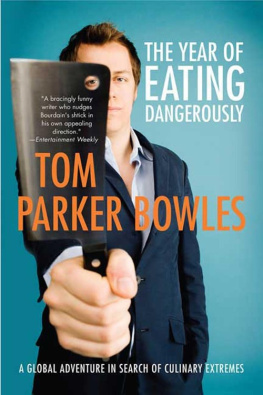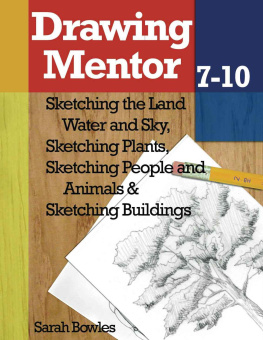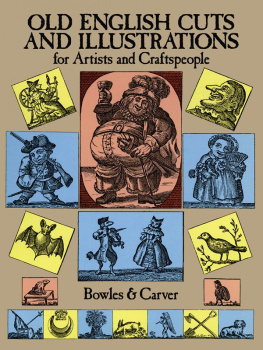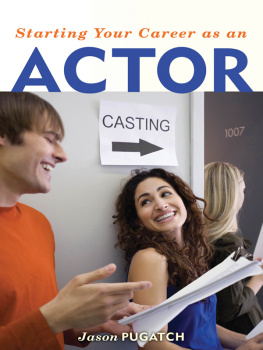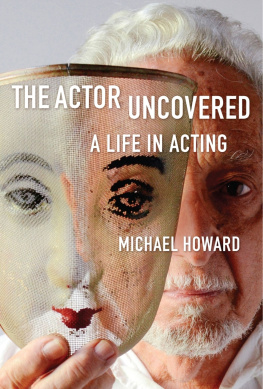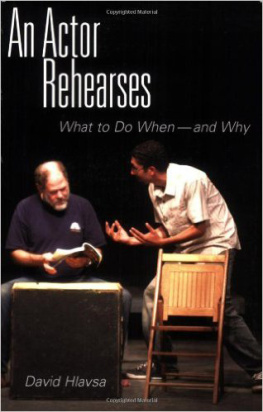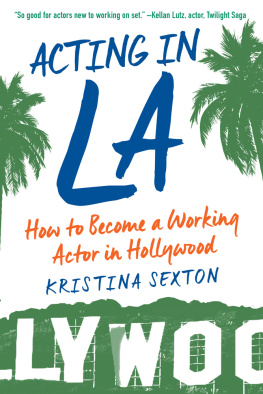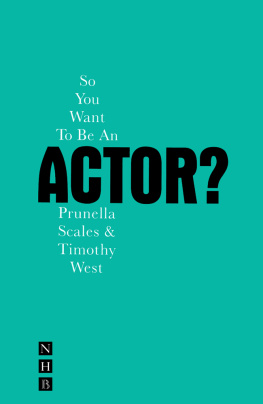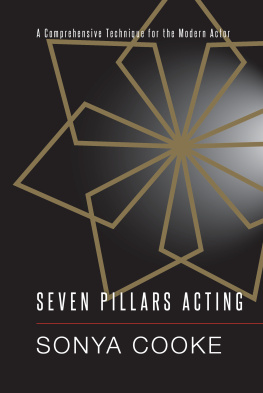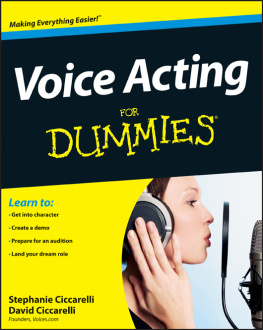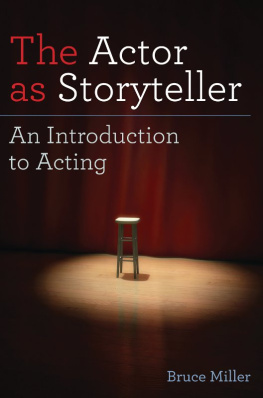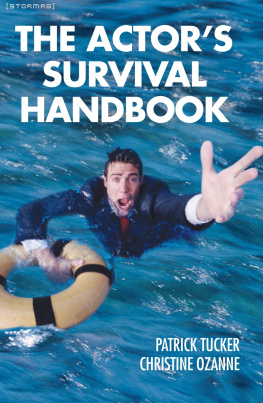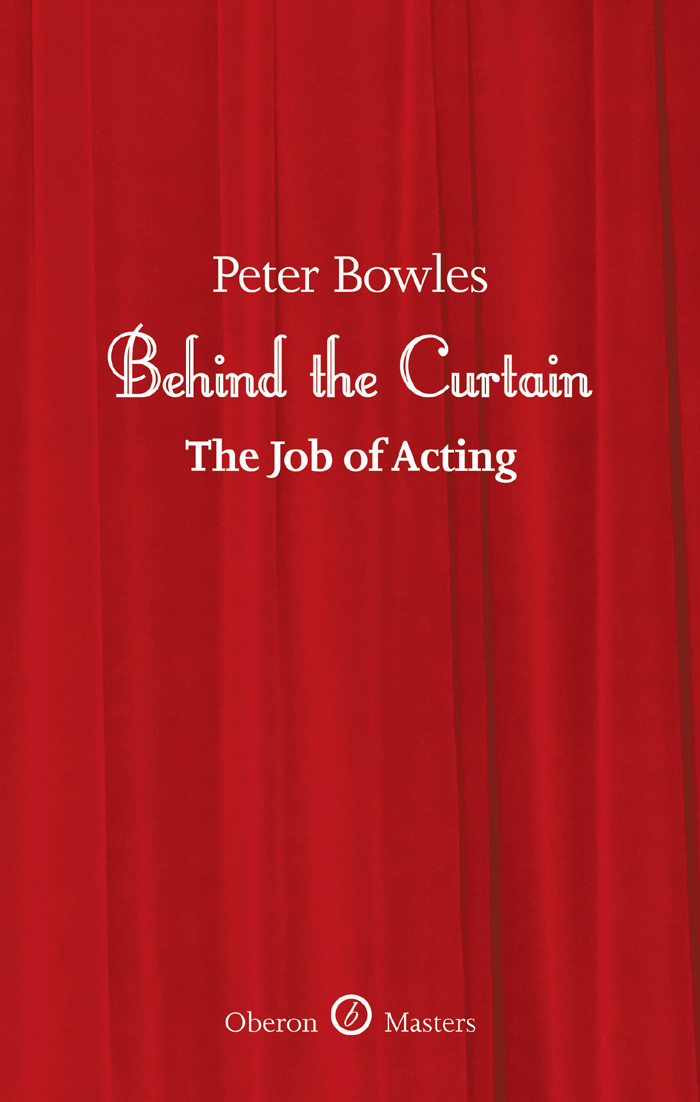BEHIND THE CURTAIN
Peter Bowles
Behind The Curtain
The Job of Acting
OBERON BOOKS
LONDON
First published in 2012 by Oberon Books Ltd
521 Caledonian Road, London N7 9RH
Tel: 020 7607 3637 / Fax: 020 7607 3629
e-mail:
www.oberonbooks.com
Copyright Peter Bowles, 2012
Peter Bowles is hereby identified as author of this work in
accordance with section 77 of the Copyright, Designs and
Patents Act 1988. The author has asserted his moral rights.
This book is sold subject to the condition that it shall not by way of trade or otherwise be circulated without the publishers consent in any form of binding or cover, stored in a retrieval system or circulated electronically other than that in which it is published and without a similar condition including this condition being imposed on any subsequent purchaser.
A catalogue record for this book is available from the British Library.
PB ISBN: 978-1-84943-215-3
EPUB ISBN: 978-1-84943-585-7
Printed and bound by CPI Group (UK) Ltd, Croydon, CR0 4YY.
Contents
To
Sir Peter Hall
I have tried to make this little book as straightforward and penny-plain as I can. This is as much for the general reader who would like to know more about the job actors do, as for an aspiring actor. Every actor is different and their feelings and experiences are their own of course. I hope however that the actors who may read this book will recognise the truth of my observations even if not agreeing with my occasional views or opinions, which I have tried to keep to an absolute minimum. For the general reader, however, I hope that they will find much of what they read interesting and even perhaps not a little surprising. All I can say is that it is not fiction but fact. That is in my opinion.
Overture and Beginners
M OST ACTORS START off by attending a drama school. There are several highly regarded ones.
In my young days sixty years ago I had never heard of drama schools, now there seems to be colleges, academies and dance-drama schools in every town in the country. Until more recent times young people were not bombarded with the temptation of easy fame, and the desire to act was a personal and in many cases a secret desire, at least from your friends. However, I am assuming that the urge to act and make a living out of doing what you love doing is the same on the whole for all the students who get into our famous drama schools like RADA the Royal Academy of Dramatic Art, the London Academy of Music and Dramatic Art, the Central School of Speech and Drama and the Guildhall School of Music and Drama, the Italia Conti and the Rose Bruford acting school. The courses are usually three years, but when I went to RADA it was just two years. I am told that the extra year is for the students to do mostly plays, as nowadays they dont have the benefit of the old-time countrywide repertory theatres to learn their craft. The main disadvantage of missing out on the training that the repertory theatres gave, is that voice production, the ability to get the words clearly to the back of any theatre without any strain, and most importantly with the appearance of being and sounding completely natural, is sometimes lacking in young actors of today. That extra year of doing plays is inevitably in the very small theatres of the academies.
Actors of course are just as talented as they always were, but in my own view (well everything in this book is my own view), while the drive towards being as real and natural on a stage is obviously a good thing, if its not conveyed to everyone in the theatre through being heard the actor has failed. The missing technique is that of appearing natural, whilst speaking with more volume and clarity than someone in real life. This failing, which is often commented on by critics, is being overcome by adding microphones to more and more theatres. Even the National Theatre has microphones. It is thought that the ancient theatres of Greece and Rome were built in such a way that sound would be amplified simply by the theatre being shaped like a megaphone, with the stage as the small mouthpiece. The aisles of the rising auditorium chanelled sound as well as people.
This striving for naturalism is also apparent in film, and is so strong now it is even difficult to understand what actors are saying in that medium, and they certainly are miked.
A friend recently did a scene with a young American star in the front seats of a car. He told me that if he hadnt known the script he wouldnt have understood what his mumbling companion was saying. If you watch the early films of the original mumbler, Marlon Brando or the natural actor James Dean they sound in todays ears as clear as a bell.
Good, Ive got that off this old actors chest!
Actors dont always have to go to drama school. Talent will out. Sir Michael Gambon of my generation is one example and the new film star Emily Blunt is another, but there are quite a few more. One of the major advantages of attending a well-known drama school is that the actor will be seen by, and hopefully be signed up by, a theatrical agent.
Agents are of absolute, irrefutable importance to an actor, no more so than when the actor is starting out. The agent is known to all casting directors, is aware of new projects that are being produced in all the media of theatre, television and film, and there are special agents for the speaking voice commercials too. Known in the profession as voiceovers.
Casting directors have become extremely powerful in the years I have been an actor, the evidence of this is at least visible in the size of their billing in any film you see today. The actor will be recommended to the casting director for a project, rather than to the director. Its the way things are done today. The only problem is, and I have often experienced it myself, the director doesnt hear that such and such an actor is free and wants a part, because the casting director will, for whatever reason, have filtered the names and only put forward the names that he/she thinks are best for the part. I even know of instances when directors have asked for a particular actor only to be told, untruthfully, that they are not available. Oh well, thats life in all walks of business I suppose.
Here is a word of advice to any actor starting out. Get a leading role as soon as possible. Easier said than done of course, but the reason, apart from the obvious, is that if you are a good actor and start with leading roles you will continue to be offered leading roles. If you are a good actor and start off playing smallish supporting roles you will be patted on the back and be offered more similar supporting roles. This maxim has been true for a number of eventual leading actors like Sir Nigel Hawthorne, Tom Wilkinson and Bill Nighy. I didnt play a leading role on the stage until I was forty-nine. No, I wasnt considered a leading man before To The Manor Born, the TV sitcom with 24 million viewers that made my name. I wasnt even invited to the BBC press launch.
The most important thing that a drama school should impart to a student is confidence. Whether they can teach that or whether that confidence has to finally come from inside the student I dont know. It certainly didnt come to me until I was in my forties, possibly because in my day my natural Midlands accent was hammered out of me at RADA, and I left not being quite sure who I really was any more. That at least does not happen today. Now all students at all drama schools are allowed to retain their own accents, although Im sure a balance is reached so they can imitate any accent that a part requires.


